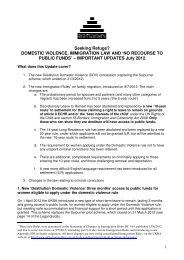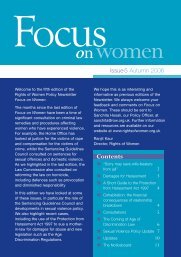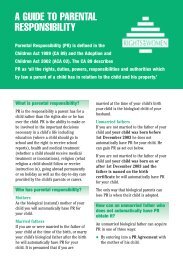Seeking Refuge? - Rights of Women
Seeking Refuge? - Rights of Women
Seeking Refuge? - Rights of Women
You also want an ePaper? Increase the reach of your titles
YUMPU automatically turns print PDFs into web optimized ePapers that Google loves.
• If you, or any member <strong>of</strong> your family, have had<br />
any medical problems, the telephone number<br />
<strong>of</strong> your doctor.<br />
• The telephone numbers <strong>of</strong> any friends, or<br />
others who are supporting you.<br />
You should also ensure that you have a file that<br />
contains all your legal documents. If you have<br />
accommodation then you should keep this next to<br />
your front door so that, if Immigration Officers<br />
come to your house, you can take the file with<br />
you into detention. If you are homeless, or moving<br />
between different places, you should keep this file<br />
with you at all times.<br />
The file should contain copies <strong>of</strong> all the legal<br />
documents that relate to your claim for<br />
protection in the UK. Documents that are given to<br />
you by the Home Office are your property. This<br />
means that you should have copies <strong>of</strong> all the<br />
documents that relate to your case. You can ask<br />
your legal representative to give you copies <strong>of</strong><br />
these. It is a good idea to give another copy <strong>of</strong><br />
your file to someone you trust, who is not going<br />
to be taken into detention. This will enable them<br />
to give the file to a legal representative, or others<br />
who are assisting you, such as your MP.<br />
Can I return to the UK after I<br />
have been removed? Re-entry<br />
bans and removal<br />
It is important to get legal advice on the<br />
implications <strong>of</strong> being returned to your country by<br />
the Home Office, rather than leaving the UK<br />
voluntarily. This is because, under recently<br />
introduced rules people who leave the UK<br />
following a refused asylum claim can, in certain<br />
circumstances, be prevented from returning to the<br />
UK for certain periods <strong>of</strong> time. This is called a reentry<br />
ban. The amount <strong>of</strong> time that you can be<br />
prevented from returning depends on how you<br />
left the UK, and on your own personal<br />
circumstances. These Rules will apply to you if you<br />
have ever:<br />
• been an overstayer in the UK;<br />
• been treated as an illegal entrant;<br />
• breached a condition <strong>of</strong> your stay in the UK;<br />
• used deception to seek entry into the UK; or<br />
• used deception to seek leave to remain in the<br />
UK.<br />
Even if you fall into one <strong>of</strong> these categories, these<br />
rules do not apply if you are applying to return to<br />
the UK to be with your husband, partner or other<br />
family members, in certain circumstances.<br />
If you are removed, you may be prevented from<br />
coming back to the UK for up to ten years.<br />
However, the number <strong>of</strong> years that you cannot<br />
return to the UK for will also depend on your<br />
personal circumstances.<br />
Can I be forced to leave the UK?<br />
Treatment on removal<br />
When you are removed, you will be escorted from<br />
the Immigration Removal Centre and throughout<br />
your journey until you arrive in your country. If the<br />
UK Border Agency is removing you, and your<br />
removal is in accordance with the relevant law,<br />
then your escorts are entitled to use force, for<br />
example, by handcuffing you, to enable them to<br />
remove you. However, during the removal they<br />
are not allowed to use force that is either<br />
unnecessary or unreasonable.<br />
Whether or not the force that is used is necessary<br />
or reasonable will depend on all <strong>of</strong> the<br />
circumstances <strong>of</strong> the case, including your<br />
behaviour. This means that it will be lawful for the<br />
person removing you to use physical force, for<br />
example, by holding you, if you are violently trying<br />
to stop your removal.<br />
However it would be unlawful to use force against<br />
someone who is not resisting removal, or to use<br />
more force than is necessary, for example kicking<br />
or hitting someone who is in handcuffs. If you<br />
experience violence, either in a detention centre<br />
or on removal, you should seek legal advice, as it<br />
may be possible to report the violence to the<br />
police and / or claim compensation from the UK<br />
Border Agency.<br />
Any force that is used against you during an<br />
unlawful removal (one that is not legally correct,<br />
for example where the court has ordered that you<br />
should not be removed) will be an assault. You<br />
will be able to claim compensation from the UK<br />
Border Agency for the harm you have<br />
experienced.<br />
Tracing family members<br />
If you have lost contact with family members who<br />
you think are still in your country, you may want<br />
to make contact with them. The British Red<br />
Cross runs an International Tracing and Message<br />
Service to help families who have been separated<br />
because <strong>of</strong> a conflict or natural disaster. For<br />
further information about the International<br />
Tracing and Message Service, visit:<br />
www.redcross.org.uk<br />
59
















